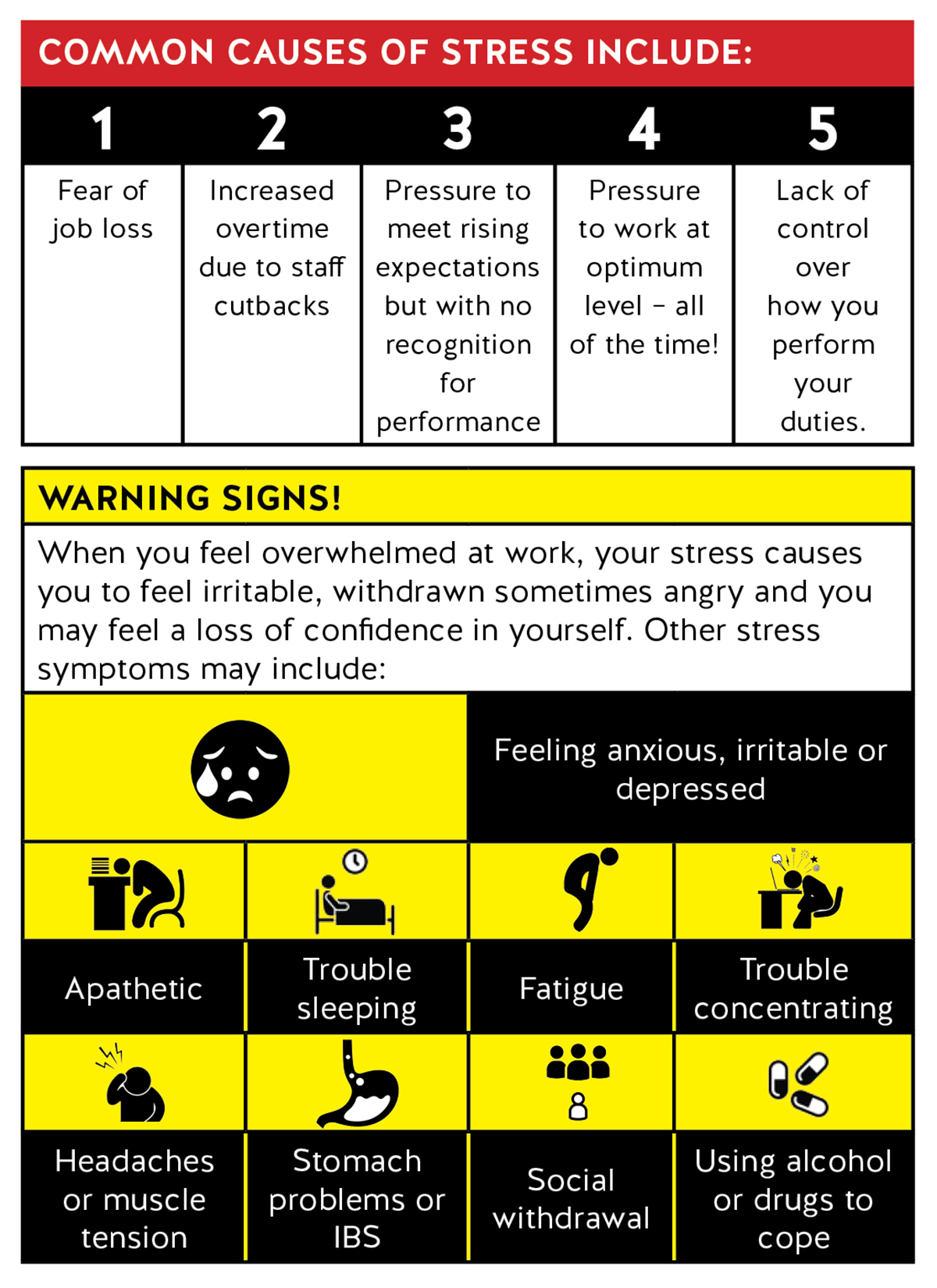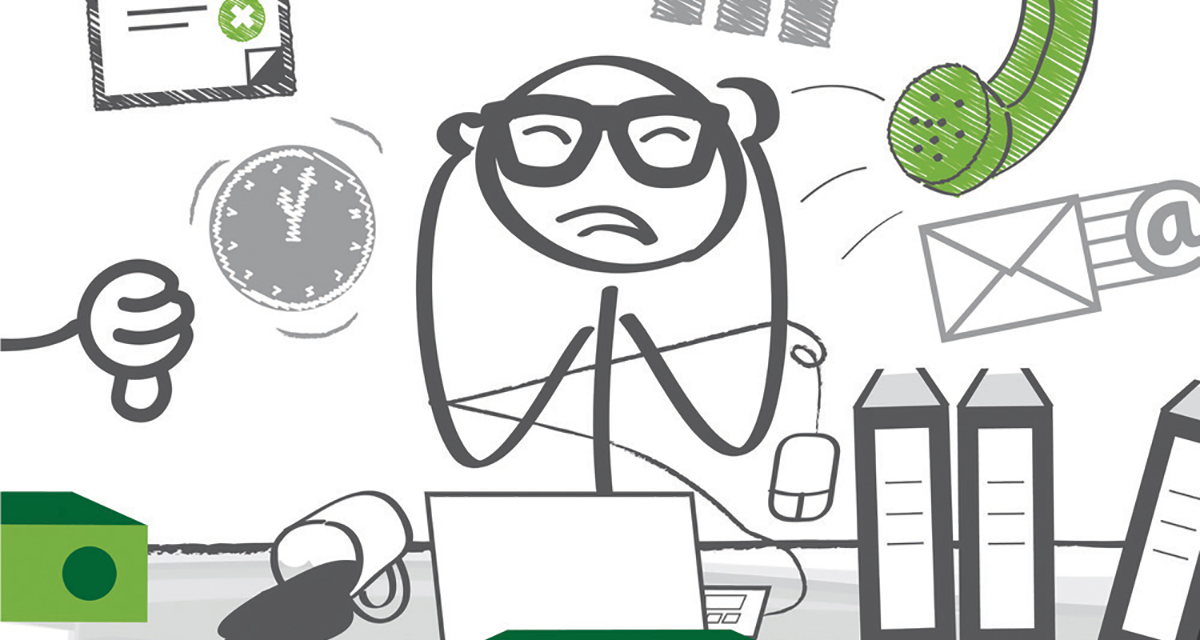While some workplace stress is normal, excessive stress can interfere with your productivity, performance and impact on your physical and emotional health. It can also affect your relationships with friends and family. You can’t control everything in your work environment, however that doesn’t mean that you’re powerless – even when you are stuck in a difficult situation.
You can take steps to protect yourself from the damaging effects of stress, improve your job satisfaction and bolster your wellbeing outside of the workplace.
In today’s world the workplace can often seem like a roller coaster, long hours, tight deadlines and ever increasing demands can leave you feeling drained, and overwhelmed. When stress exceeds your ability to cope, it starts causing damage to your mind and body as well as your job satisfaction.
If stress on the job is interfering with your job performance, health and or personal life, it’s time to take action. No matter what your job is, there are things you can do to reduce your overall stress levels and regain a sense of control at work.

Ways to Beat Workplace Stress
1. Reaching out
Sometimes the best stress reducer is to simply talk to someone else close to you. By talking it through and getting some sympathy and support especially face to face can be a highly effective way to get it off your chest and regain a sense of calm. The other person doesn’t have to “fix” the problem, they just need to be a good listener.
Turn to co-workers for support
Having a solid support system at work can help you from the negative effects of job stress. Just remember to listen to them and offer support when they need it as well.
Talk to your Union Delegate
By confiding in your union delegate can also assist. Your delegate will also be able to assist you in putting you in touch with your union who can provide you with assistance where needed.
Lean on friends and family members
Having a strong network of supportive friends and family members is extremely important in managing stress in all areas of your life.
Build new satisfying friendships
If you feel that you don’t have anyone to turn to at work or in your free time, it’s never too late to build new friendships. Meet new people with common interests by taking a class or joining a club, or volunteer your time or try a sport.
2. Support your Health with Exercise and Nutrition
When you become overwhelmed by work, it is easy to forget your physical health.
Taking care of yourself through good nutrition and exercise makes you stronger and more resilient to stress.
This doesn’t mean you need to make total lifestyle changes, just the small changes can lift your mood, increase your energy and make you feel like your back in the driver’s seat.
3. Don’t skimp on sleep
Skimping on sleep interferes with your daytime productivity, creativity, problem solving skills and ability to focus. The more rested you are, the better equipped you will be to tackle the day and cope with workplace stress.
Improve the quality of your sleep by making healthy changes to your routines for example go to bed and get up at the same time every day even on weekends, be smart about what you eat and drink during the day and aim for at least 8 hours a night sleep – the amount most adults require to operate at their best.
4. Prioritise and Organise
When workplace stress threatens to overwhelm you, learn to manage your day through time management
Some Time Management Tips for reducing stress include;
- Creating a balanced schedule – try and find a balance between work and family life, social activities and solitary pursuits, daily responsibilities and downtime.
- Leave earlier in the morning – even 10 – 15 minutes can make the difference between frantically rushing and having time to ease into your day. If you are always running late, set your clocks and watches fast to give yourself extra time and decrease your stress levels.
- Plan regular breaks – make sure you take short breaks through the day to take a walk, chat to a friendly face, or a short meditation break to clear your mind. Try to get away from your desk or work station for lunch. This will help you relax and recharge and be more not less productive.
- Establish Healthy Boundaries – Many of us feel pressured to be available 24 hours a day or obliged to be checking the smart phone for work related messages and updates. It’s important to maintain periods when you’re not working to not think about work. This requires not checking emails or taking work related calls in the evenings or on weekends when you should be focusing on friends, family and rest.
- Don’t over commit yourself – Avoid scheduling things back to back or trying to fit too much in one day. If you find that you have too much on distinguish between the “should” and “musts”. Drop tasks that are not truly necessary to the bottom of the list or eliminate entirely.
Task Management Tips to Reduce Stress
- Prioritise tasks – Tackle high priority first and if you have something particularly unpleasant to do, get it over with first then the rest of the day will be pleasant as a result.
- Break projects down into small steps – If a large project seems overwhelming, focus on one manageable step at a time rather than tackling it all at once.
- Delegate responsibility – you don’t have to do it all yourself. Let go of the feeling that you have to be everything for everyone. You will be letting go of unnecessary stress in the process.
- Be willing to compromise – Sometimes, if you can both bend a little at work, you’ll also be able to find a happy middle ground that reduces stress levels for everyone.
5. Break Bad Habits that contribute to Workplace Stress
- Many people make stress worse with negative thoughts and behaviour. If you can turn this around, you will find employer-imposed stress easier to handle.
- Resist perfection – When you set yourself unrealistic goals, you are setting yourself up to fall short. Aim to do your best. No-one can ask for more than that.
- Flip your negative thinking – When you focus on the downside of everything, you’ll find yourself drained of energy and motivation. Try to think positively about your work, avoid negative thinking co-workers, and pat yourself on the back about small accomplishments, even if no one else does.
- Don’t try to control the uncontrollable – many things at work are beyond your control – particularly the behaviour of other people. Rather than stressing out over them, focus on the things you can control such as the way you choose to react to problems.
- Look for humour in the situation – When used appropriately, humour is a great way to relive stress in the workplace. When you or those around you start taking things too seriously, find a way to lighten the mood by sharing a joke or a funny story.
- Clean up your act – if your desk or work space is a mess, file and throw away the clutter, just knowing where everything is can save time and cut stress.
6. Be proactive about your job and your workplace duties
Here are some things you can do to regain a sense of control over your job and career
- Talk to your employer about workplace stressors – Healthy and happy employees are more productive so your employer has an incentive to tackle workplace stress whenever possible. Rather than rattling off a list of complaints, speak to your employer about specific conditions that are impacting your workplace performance.
- Talk to you union delegate – If your employer doesn’t want to listen, speak to your union delegate about the specific conditions that are impacting your workplace performance. Your delegate can then raise them with the employer on your behalf and or raise them with the Work Health and Safety Committee. Don’t be afraid to raise your concerns as these may also be impacting on other workers as well.
- Clarify your job description – As your manager or supervisor for an updated Position Description and responsibilities. You can then review these responsibilities against what you have been expected to do and be able to do something about it. You can either raise this directly with your manager or supervisor or raise this with your union delegate who can arrange a meeting with your manager to discuss.
- Request a transfer – If your workplace is larger enough, you might be able to escape a toxic environment by transferring to another department.
- Ask for new duties – if you have been doing the same work for a long time, ask to try something new, a different grade level, a different role, or a different machine.
- Take time off – If burnout seems inevitable, take a complete break from work. Go on a holiday, use up some personal leave, ask for a temporary leave of absence if you can.
- Use the time away to recharge your batteries and take perspective.
- Speak to your doctor – make some time to see your doctor and discuss the situation, your doctor can make some recommendations in how to find some perspective and assist in relieving stress.
- Talk to your union official – the United Services Union can also assist you in dealing with what is causing workplace stress. Contact the USU either through the union helpline or speak to your union delegate for details.
7. Look for satisfaction and meaning in your work
Feeling bored or unsatisfied with what you do for large parts of the day can cause high levels of stress and take a serious toll on your physical and mental health.
Having the dream job that we find rewarding and meaningful is just that – a dream, however you can still find purpose and joy in a job that you don’t love.
Even in some mundane jobs, you can often focus on how what you do helps others for example, or provides a much needed product or service. Focus on aspects of the job you do enjoy – even if it’s chatting with co-workers at lunch. Changing your attitude towards your job can also help you regain a sense of purpose and control.
8. Talk to the United Services Union
The USU can assist by speaking to your employer about how to reduce workplace stress at work.
Unions can meet and work with Managers to find effective solutions to reduce workplace stress. Having employees suffering from work related stress can result in lower productivity, lost work days and a higher staff turnover. As a manager, your employer has a responsibility to do what they can to reduce workplace stress.
Unions can assist through meeting employers about:
- Consulting with employees – Unions can facilitate meetings with managers and Union Delegates to discuss specific factors that make the job stressful. Some things such as failing equipment, understaffing or a lack of supervisor feedback may be relatively straight forward to address. Sharing information with employees can also reduce the uncertainty about jobs and futures.
- Dealing with workplace conflicts in a positive way – Unions can work with employers to establish workplace policies to deal with zero tolerance for workplace bullying and harassment. This in turn establishes dignity and respect for every employee in the workplace.
- Dealing with unrealistic deadlines – Unions can speak to the employer about the stress placed on employees due to unrealistic goals and deadlines and the stress this causing employees.
- Clarifying expectations – Unions can assist by speaking to the employer about employee roles, responsibilities and goals in an effort to get the employer to clarify and clearly define what the role, responsibility and goals are to make the management actions fair and consistent with their organisational values.
You can contact the USU in a number of ways
- Through the USU website here
- Talk to your union delegate
- Call the union’s help desk on 1300 136 604
- Look up the USU Facebook page.
If you are not a member of a union you can join the USU by going to any of the contact information avenues listed above.
Remember! Workplace Health and Safety is Union Business!





